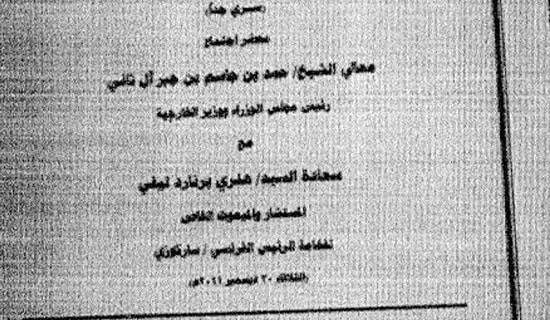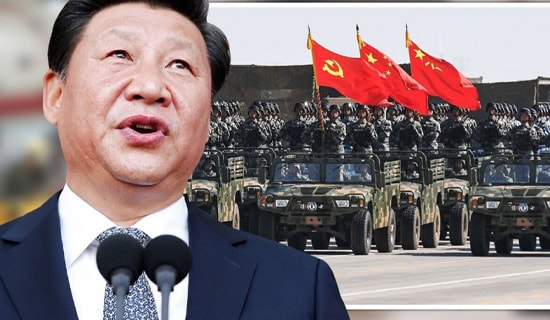In his speech at the Arab Summit in Amman, Syrian President, Bashar Al-Assad, criticized Arab leaders who distinguish between Israeli governments and public. He supported the Intifada and called for strengthening Syrian-Palestinian relations. He also proposed renewing the Arab boycott on Israel and establishing an international court for "Israeli war criminals." Following are excerpts from this speech:
The Israeli Government and the Public Are the Same
"...We [the Arabs] have drowned to our ears in analyses about the significance of the arrival of the new infant, Sharon, and forgotten all the rest. We began comparing who was better, the former [Prime Minister] or his predecessor? Who is closer to the Arabs? Who is closer to peace and who is closer to war?"
"...Some of us were terrified. Others were inflicted with guilt. Once the final results of the elections became clear, [we began] occupying ourselves with analyzing the differences between right and left in Israel. Some [of us] are not ready to admit... that as far as the Arabs go, there is no difference between right and left in Israel."
"In Israel, whoever murders a thousand Arabs belongs to the left, and whoever murders five thousand Arabs belong to the right. When someone shows up and murders ten thousands Arabs, the right becomes the center and a new rightwing emerges. For us, as Arabs, all Israelis belong to the rightwing. [While] we occupied ourselves with analyzing all these issues, which neither added nor subtracted anything - we forgot that there is an Israeli street [referred to hereafter as, "public"] that is the reason for everything, while all the rest is nothing but consequences."
"The Israeli public assassinated Rabin when it suspected, merely suspected, that this man might give something for peace. I am not saying that he gave anything, only that he might have. The mere suspicion made them assassinate this man, despite the fact that he was a hero for breaking the Palestinians' bones in the first Intifada."
"This public rejected Peres when it suspected him of being less of an extremist than Netanyahu, although Peres gave the Israeli public the gift of the Qana massacre (in Lebanon)."
"This public ousted Barak when it suspected him of being less of an extremist than Sharon and when it suspected that by his illusionary and deceptive proposals he might give something for the peace process. Though Barak gave the Israeli public the gift of more than 400 Palestinian martyrs."
"And now, this public is [responsible] for bringing Sharon..."
"Some foreigners and Arabs tell us that although Sharon may indeed oppose peace, the Israeli public is different. Why don't we tell them - Sharon is described all over the world, and even within Israel, as a man of massacres; a man who has murdered; a man who hates Arabs. It is true. He hates anything that has to do with the Arabs. How did this man become Prime minister? ...He obtained [his position] through the will of the Israeli public. [Therefore,] how do they want us to be convinced, and convince the Arab public, that this Israeli public that elected a man like Sharon, wants peace, wants to return Arab rights, and is not hostile to Arabs and Muslims? We must focus on the [Israeli] public, before we focus on personas and governments."
"Some say we should give Sharon a chance. We must ask, at least, what they mean by using the word 'chance?' And why should we give him a chance? ...Will Sharon become, all of a sudden, a peace dove? Will the Israeli public turn, all of a sudden, into an Arab-loving and non-racist public? Secondly, what is the meaning of the word 'chance?' A chance means giving time. What is the meaning of this hiatus? Does it mean more time to murder Arabs, or more time to bring about [Arab] concessions?"
SUPPORT OUR WORK

"We must understand the Israeli public: This public began the peace process in Madrid in 1991 with Shamir, and it ends it now with Sharon. The names that came in between are, of course, similar to one another. There is no difference between the first to the last and to those who were in between..."
"We use to say: 'the [Israeli] PM is a racist;' 'the government is racist;' 'the security forces and the Army are racist.' By what logic do we remain silent when we come to talk about Israeli society? This is a racist society. More racist than the Nazis. In close forums everybody says that. Every Arab citizen says that. Since we represent the Arab peoples, it is only natural that we talk in a way that reflects the consciousness of the Arab citizen. We must not wait for definitions by the West, East, North, or South. We must make our own definitions and spread them. Let us be courageous and determine the definitions clearly. If we do not take action, the world will not work with us."
"We must be careful not to turn this summit into 'a Wailing Wall' were we sit to complain and whine, or into a charity where we meet in order to beg the world for aid. We must be courageous, make courageous resolutions, and beware of considerations that are not useful for us. We must take into consideration [everybody], beginning with the far West in the US, through Europe, and all the way to the East. Sometimes, we even take into consideration that a newspaper somewhere in the world might attack us..."
"It is not logical that we make all efforts to implement the advice that comes to us from foreign non-Arab countries, (but) when the Arab public ask us to do something - we say it is undoable. On the contrary: we are 300 million Arabs, and when we make a courageous and clear resolution, 300 million will support us morally and materially. If we don't, nobody, Arab or non-Arab, will stand by us and we will go from bad to worse."
"Therefore, we must beware not to fall in the trap of making our position and policies depend on Israeli figures or on the Israeli public, which proves day in and day out that it opposes peace."
"When non-Arabs come to us and say: 'so-and-so [in Israel] is gone and that means that they have changed their minds', we reply: 'true, so-and-so has gone, but the Israeli public remains the same, with its mentality, racism, and extremism."
"Regarding the claim that is brought up by some, that Sharon does not [represent] the Israeli public - this claim does not convince anyone anymore."
"Some always argue that [it is the result] of the fear and anxiety among the Israelis. We always hear this argument, and unfortunately, it is quite common among the foreigners, as well as among Arabs, ...Thanks to this fear, Israel is allowed to violate international resolutions, kill Arabs, occupy lands, and give back only part of the land. When is one neighbor afraid of the other? ...When the first has a history of aggression and he expects his neighbor to retaliate one day. Never have we attacked Israel. We are always being attacked. If they keep the strongest army in the region with superiority over all the Arabs combined, what are they afraid of?"
"The Israelis are afraid of three things: The first point is their recent past of oppression that began some years before the declaration of the State of Palestine in 1948 [sic.]. The second point is their past in the general sense, meaning history. They do not have a history. We have history and they know this very well. They were out of the region for thousands of years. The third is the land. Every Israeli knows that he is not the owner of this land. This land is owned by the Arabs, and so, Israel never feels confident..."
Syria and the PLO
"After ten years of a peace process that excelled in failure -- and I emphasize the word 'excel' since it is difficult to find something that is more of a failure than this peace process -- after ten years of hard pressures on Syria to accept a defective peace - after ten years of Syrian resistance to any peace that is not just and comprehensive and that does not give back the lands to their legal owners - after ten years of lack of coordination with the Palestinian track and a continuous coordination with the Lebanese track - what is the result?"
"The result is more [credit] points and strong [pressure] cards in Syria's account..."
"We say to our Palestinian brothers in and out of this hall, and everywhere in the world: our cards are in the service of the Palestinian cause."
"Although there has been no coordination between [the Palestinians and] us for ten years, the Palestine issue remained the central cause for Syria and all the Arabs. Our brothers in the Golan are listening to us now and they are not ready for a solution to the (Syrian) national problem [i.e. the Golan] that will be on the expense of our Palestinian brothers. We say: Let bygones be bygones. We do not live in the past, but we do learn its lessons..."
"We reach our hands to our Palestinian brothers and tell them: 'We stand by you in the service of the Palestinian cause knowing that the Syrian method and logic leads to one and one only clear and defined goal: the return of the Arab rights in their entirety... they do not lead to concessions."
"Therefore, we stand by you [in your demand] for regaining East Jerusalem in its entirety, for an Israeli withdrawal to the June 4, 1967 borderline, for the return of all refugees with no exception, for the establishment of a Palestinian state with Jerusalem as its capital, for support for the Intifada, and for regaining every Arab right..."
"It is vital to support the Intifada by various means the most important of which are: direct emergency material aid in order to put an end to the negative consequences of the siege that was put on the Palestinian towns and villages in order to force them to surrender. There must be an international campaign to establish the legitimacy of the Intifada, which is a form of Resistance, and after all, Resistance is a legitimate right of nations whose lands were occupied and whose rights were robbed..."
"This is the place to mention what was agreed to in the last Arab summit in Cairo regarding the need to establish a court for Israeli war-criminals who committed massacres. This does not mean only those who committed massacres against the martyrs of the Intifada; the intention is to bring to court any Israeli who is directly involved with the murder of an Arab anywhere in the world. Some may think this is nothing but a dream; nevertheless, it can come true, even if it takes time. What is important is that if we act with determination we will get what we want..."
"It is important to renew the laws of the Arab boycott on Israel by stopping all forms of cooperation and all relations with it until it surrenders to the terms of peace ..."[1]
[1] Tishrin (Syria), March 28, 2001. The subtitles were added by MEMRI.




